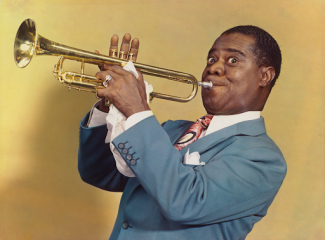
In the mid-1930s, Louis Armstrong took jazz mainstream. This led some fans to accuse him of selling out.
Jet magazine called Armstrong an Uncle Tom because in his films he portrayed buffoonish characters that offended Black people. Some musicians claimed he spent too much time “clowning” onstage to amuse white audiences.
Others complained that Louis Armstrong was not political enough, but his resistance to racism was so subversive that it was easy to miss. In Memphis in 1931 he was arrested for sitting next to a white woman — his manager’s wife — on a bus. In his show the next night, he made a point of dedicating a song to the police, performing “I’ll Be Glad When You’re Dead You Rascal You.” The cops in attendance applauded, but the Black musicians all got the joke.
In 1957, he declined to go on a government-sponsored tour of the Soviet Union, because he wanted “two-faced” President Eisenhower to “show some guts” and protect the Little Rock Nine. Then in 1969, he turned down an invitation to perform at the White House because he thought President Nixon’s request was disingenuous.
Louis Armstrong picked his battles and kept his political opinions to himself. Although many wished Armstrong had been more vocal, the private letters and tapes released after his death revealed the spirit of resistance behind that famous smile.